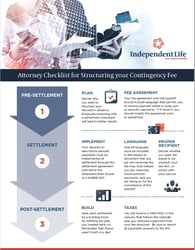5 Things Every Attorney Should Know About Structuring Attorney Fees
Most plaintiff attorneys have a fundamental understanding about structured settlements and the benefits structured settlements can provide to their clients. Many plaintiff attorneys, however, are less familiar with potential advantages structured fees can offer for their own financial and retirement planning. Here are five things every attorney should know about structuring his or her attorney fees – recognizing that the following discussion is not intended as legal or tax advice and should not be relied upon without the advice of a qualified professional advisor.
#1: Only Contingent Fee Attorneys Can Structure Their Fees
Structured fees, which defer taxation until future payments are actually received, are only available to contingent fee plaintiff attorneys as opposed to attorneys who are paid hourly fees or flat rate fees. The legal authority to do so was first established in the Childs v. Commissioner case in 1994 where the IRS unsuccessfully challenged multiple legal fee structures. In the Childs case, as in most structured fee cases which have followed, the settlement documentation required the defendant to purchase an annuity to fund payments to the attorneys over time. Overruling the IRS “constructive receipt” argument, the Tax Court and Court of Appeals held that the settlement documents determined the timing of the attorney’s income.
#2: You Must Amend Your Attorney-Client Agreement Before Settlement Documentation is Signed
To successfully defer attorney fees, a plaintiff attorney must agree to do so by signing or amending his or her attorney-client agreement (or to at least have the option to do so) before the settlement documentation is signed. This is one of the requirements of the Childs case to avoid constructive receipt. Another requirement, similar to a regular structured settlement, an attorney cannot own the annuity that funds a structured fee and should have no rights greater than a general creditor against the structured fee obligor (owner of the structured fee annuity). Otherwise, he or she risks a tax challenge on account of present economic benefit.
#3: There are Several Structured Settlement Product Options Depending on Your Case
Multiple product options are available to structure attorney fees depending upon whether the underlying case involves IRC 104(a)(2) physical personal injuries. For personal physical injury cases, most structured settlement annuity providers, including Independent Life, offer structured attorney fees through an IRC 130 qualified assignment – even if the attorney’s client decides to settle on a “cash only” basis. Independent Life also offers non-qualified structured settlements which attorneys can utilize to structured fees in cases which do not include physical personal injuries. As with structured settlements, the payout options for structured fees are diverse including deferred payouts, lifetime payouts, certain only payouts and deferred lump sums.
#4: Structured Fees are not Limited to Sole Practitioners
Structured fees are not limited to sole practitioners. If an attorney practices with a firm, the firm is likely entitled to any fee he or she earns. In that case, it is possible for the firm to receive the structure fee payments and distribute the payments to one or more attorneys when they are received. Alternatively, if the firm and the attorney agree separately, the structure fee payments can alternatively be paid directly to the attorney.
#5: A QSF is a Great Settlement Technique for Plaintiff Attorneys
IRC 468B Qualified Settlement Funds (QSFs) provide plaintiff attorneys and their clients with important advantages as a settlement technique for complex personal injury cases. QSFs offer a safe harbor for claimants with unlimited time to resolve their own issues before any form of distribution, including structured settlements, is decided upon and before tax and other financial results are locked in place determining “receipt” of settlement proceeds. This additional time can also provide an attorney with a planning opportunity to consider the advantages and options afforded by structured attorney fees.
Download our helpful attorney fee checklist to get started today!



